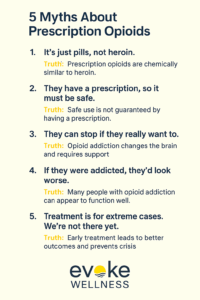When a child’s behavior shifts suddenly—grades drop, mood changes, sleep disappears—parents search for answers. And when those answers point to pills, there’s a moment many families hit: denial disguised as logic.
“It’s not heroin. It’s just pain pills.”
It feels like a comfort. A way to believe things aren’t as serious as they look. But opioid addiction doesn’t care about whether it starts in a pharmacy or on the street. In Massachusetts and across the U.S., prescription pills are a major gateway into life-threatening addiction.
That’s why seeking help from an experienced Opioid Rehab Program in Massachusetts can be a critical step toward real healing.
At Evoke Wellness at Cohasset, we’ve helped thousands of families confront the truth about opioid use—and find real, compassionate solutions. Let’s dismantle five of the most common myths that keep families stuck.
Myth #1: “It’s just pills, not heroin.”
Truth: Oxycodone and other prescription opioids hit the same brain receptors as heroin. They are chemically similar, just manufactured in different settings.
It’s tempting to believe that because the source is a pharmacy, the substance must be safer. But in the brain, opioids are opioids. Whether swallowed, snorted, or injected, they create the same euphoria, the same tolerance buildup, and the same risk of overdose.
Worse yet, when prescriptions run out or become too expensive, many people turn to heroin or fentanyl-laced pills bought off the street. These are often cheaper and more potent—and far more deadly.
Myth #2: “They have a prescription, so it must be safe.”
Truth: A prescription does not mean someone is using medication safely—or as prescribed.
Medications like Percocet or Vicodin may be legally prescribed, but misuse is rampant. That could mean taking more than prescribed, using someone else’s prescription, or mixing pills with alcohol or other substances.
Teenagers and young adults often experiment under the radar. What starts as a way to manage stress or physical pain can quickly spiral into dependence. Parents may not notice until withdrawal symptoms, missing pills, or changes in behavior become impossible to ignore.
Myth #3: “They can stop if they really want to.”
Truth: Opioid dependence changes the brain’s chemistry. Willpower alone isn’t enough.
Opioids don’t just create a high—they rewire the brain’s reward system. Over time, the body becomes physically dependent. Without the drug, the person experiences intense withdrawal: chills, nausea, restlessness, bone-deep pain.
That’s not a character flaw. It’s a medical condition.
Expecting your child to “snap out of it” or “just stop” can unintentionally deepen shame and resistance. Real recovery often requires structured support: medical detox, behavioral therapy, and ongoing care that treats the whole person.
Myth #4: “If they were addicted, they’d look worse.”
Truth: Many people with opioid use disorder appear “normal” for a long time.
Your child might still go to school. Hold a job. Show up to dinner. That doesn’t mean they’re not struggling. The early stages of addiction often involve functioning through it—until they can’t.
The idea that someone has to “hit rock bottom” or look like a stereotype before needing help is both dangerous and outdated. Substance use is a progressive illness. Intervening early can prevent irreversible damage.
If you’re noticing secrecy, sudden money issues, mood swings, or changes in sleep, trust your instincts. You don’t need a smoking gun to get support.
Myth #5: “Treatment is for extreme cases. We’re not there yet.”
Truth: Waiting for a crisis makes everything harder. Early intervention saves lives.
Addiction doesn’t start at overdose. It starts with a pattern: using to cope, needing more to feel okay, hiding usage, feeling sick without it. That’s where treatment begins to make a difference.
Opioid addiction treatment isn’t one-size-fits-all. At Evoke Wellness at Cohasset, we offer multiple levels of care—including outpatient support, medication-assisted treatment (MAT), and residential options tailored to each person’s needs.
You don’t have to wait for jail, overdose, or total collapse. You can intervene now—and change the outcome.
Still Not Sure What to Look For?
Here are some common signs your child may be misusing opioids:
- Using more medication than prescribed or running out early
- Sudden changes in mood, energy, or sleep patterns
- Missing school, work, or social obligations
- Withdrawing from family or usual activities
- Stealing, lying, or unexplained spending
- Frequent flu-like symptoms or complaints of pain
Even if just a few of these sound familiar, it’s worth a conversation. And it’s worth finding out what support is available.
Frequently Asked Questions
Q: Is it really addiction if they’re just using once in a while?
A: Frequency isn’t the only indicator. If someone uses opioids to cope with stress, avoid emotions, or feels anxious without them, it may already be a problem. Early intervention is always safer than waiting.
Q: What if my child refuses treatment?
A: Resistance is common. We can help you learn how to approach conversations, set boundaries, and offer options that preserve the relationship without enabling the behavior.
Q: How do I choose the right level of care?
A: That’s what we’re here for. Our admissions team works with you to assess what level of support makes sense based on your child’s needs, history, and readiness. Options range from outpatient to residential.
Q: Is opioid addiction treatment available locally in Massachusetts?
A: Yes. Evoke Wellness at Cohasset offers opioid addiction treatment in a compassionate, medically-supported environment. We serve families across the state and help them find hope and clarity.
Massachusetts families deserve answers and action—not another close call.
If your child is using opioids or you’re worried they might be, don’t wait to find out how bad it could get.
Call Evoke Wellness at Cohasset at (866) 931-6429
Our experienced clinical team will help you understand what’s going on and what to do next—with clarity, compassion, and care. Learn more about opioid addiction treatment in Massachusetts by calling (866) 931-6429.
You don’t have to guess. You don’t have to wait. There is real help available—today.





